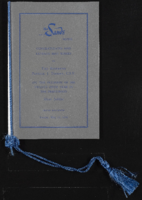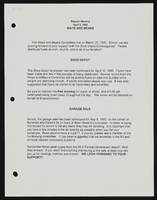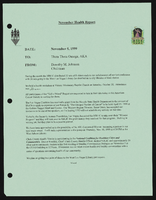Search the Special Collections and Archives Portal
Search Results
Eaton, Mary, 1908-2009
Mary Eaton was born April 14, 1908 in Kansas. She was born Protestant and became involved with the Grace Community Church. Mary married her husband, Bruce, in June of 1931. They moved to Boulder City, Nevada in 1932 and raised their two children there. Eatn was a teacher and civic leader in Boulder City. She passed away January 31, 2009.
Person

Silver jubilee celebration dinner for Father Patrick J. Toomey: photographs and publicity records
Date
Archival Collection
Description
Series XXII. Social Functions
Sands Hotel and Casino
Mixed Content

Alpha Kappa Alpha Sorority, Theta Theta Omega Chapter ways and means committee agenda
Date
Archival Collection
Description
From the Alpha Kappa Alpha Sorority, Incorporated, Theta Theta Omega Chapter Records (MS-01014) -- Chapter records file.
Text

Transcript of interview with Wesley Troy Adams by Katherine D. Beal, March 01, 1977
Date
Archival Collection
Description
Text

Transcript of interview with Miriam Belmont by Laurie Brower, March 8, 1975
Date
Archival Collection
Description
Text

Transcript of interview with Mary & Bruce Eaton by Beatrice Scheild, March 8, 1975
Date
Archival Collection
Description
On March 8, 1975, Beatrice Scheid interviewed Mary and Bruce Eaton about their lives in Boulder City, Nevada. Mary first talks about her life in the early days of Boulder City, specifically the influences of the churches and schools. She also talks about housing, transportation, and her career as an educator. Bruce (born 1904 in Toronto, Kansas) also talks about his life in Boulder City and his arrival to Southern Nevada as he sought employment in working on the building of Hoover Dam. Bruce talks about his employment with Six Companies, Inc. and discusses topics such as the employment wages, his and Mary’s experiences in building a house, and their experiences in buying a house built by Six Companies. Bruce also talks about the roles of Sims Ely, the city manager of Boulder City, and Frank Crowe, the construction superintendent of Six Companies. Bruce then discusses the issues of worker’s compensation as it related to work on the dam, and he describes, in detail, the cooling system us
Text

Transcript of interview with Arne Rosencrantz by Claytee White, February 9, 2010
Date
Archival Collection
Description
In this interview, focused on the John S. Park neighborhood of Las Vegas, Arne Rosencrantz discusses his childhood growing up in Las Vegas. He talks about local businesses, including his father's furniture store, as well as schools and churches in the neighborhood.
Arne Rosencrantz remembers living on Beverly Way from 1954 to 1970. Like so many others from that era, he attended Fifth Street School, John S. Park Elementary School, John C. Fremont Middle School and graduated from Las Vegas High School. As a Jew, he was in a small minority, but fondly recalls growing up in the dense Mormon population of John S. Park Neighborhood. As a youngster, life in Las Vegas was filled with fun. The desert provided opportunity to hunt lizards and rabbits. Kids walked to school without concern. They played ball and found the Strip casinos welcoming to locals. He tells how the social issue of segregation of the 1960s did not affect him personally, but how local movie theatre owner Lloyd Katz fought to make his Huntridge and Fremont theatres integrated. He also reminisces about his father opening Hollywood Furniture and later Garrett's Furniture, which Arne operated until retiring in 2001. During the interview, he lists other furniture companies and the strong assortment of other retailers and restaurants that served the neighborhood.
Text
Audio clip from interview with Greg Goussak on May 19, 2015
Date
Archival Collection
Description
In this clip, Greg Goussak describes his family's involvement with the Albert Einstein Hebrew Day School where his mother was the director in the 1970s.
Sound

Alpha Kappa Alpha Sorority, Theta Theta Omega Chapter health committee report
Date
Archival Collection
Description
From the Alpha Kappa Alpha Sorority, Incorporated, Theta Theta Omega Chapter Records (MS-01014) -- Chapter records file.
Text

